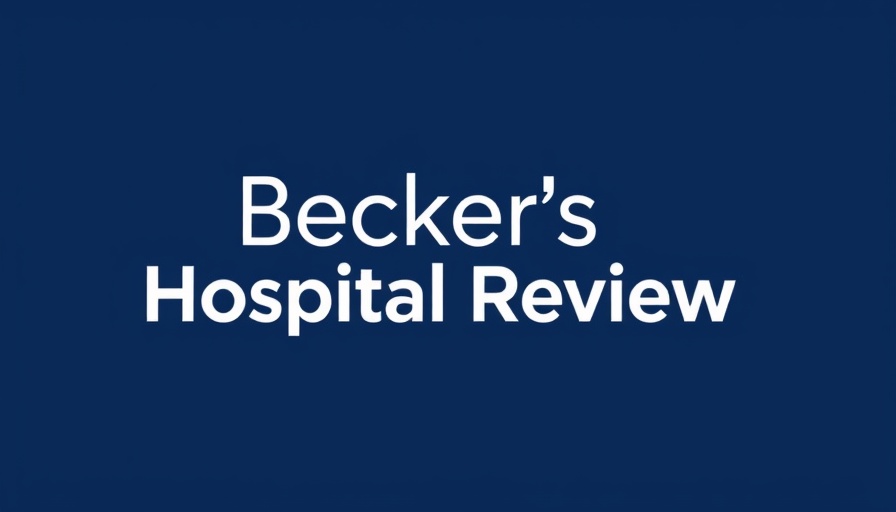
AI: The Future of Healthcare Workforce Preparation
As the healthcare landscape rapidly evolves, artificial intelligence (AI) is playing a crucial role in shaping the future of workforce preparation across hospitals and health systems. From enhancing patient engagement tools to optimizing practice efficiency solutions, healthcare organizations must equip their employees with the necessary skills to thrive in a tech-enhanced environment. This urgency comes as initiatives around AI are not just limited to healthcare applications themselves, but extend to the training and education of personnel working within the framework of these futuristic systems.
How Hospitals Are Innovating Workforce Training
Health systems like Mercy in St. Louis have started their journey towards workforce preparation several years ago. Through innovative initiatives such as "AI Dev Days," Mercy fosters collaboration among nurses, engineers, clinicians, and change managers. These workshops allow employees to engage with real-world AI applications, creating a formal community with over 140 members. Such initiatives not only scale knowledge but also ensure that talent keeps pace with technological advancements, thus supporting overall healthcare compliance and operations.
Meanwhile, Stanford Health Care launched an organization-wide "AI 101" course aimed initially at IT staff but has since expanded to include all employees. This program focuses on providing access to curated tools that encourage staff experimentation with AI technologies. According to Dr. Michael Pfeffer, chief information and digital officer at Stanford, the goal is to eliminate the notion of a single AI team. Instead, everyone in the organization must possess a basic understanding of AI and its applications for maximum effectiveness.
Empowering Employees Through Learning Platforms
With the introduction of initiatives like the "AI Learning Academy" by CommonSpirit, health systems are enacting strategies designed to teach their workforce the practical application of emerging technologies. This educational focus not only motivates employees but also establishes a culture of continuous learning. By integrating AI training into daily routines, healthcare workers are better positioned to embrace innovation, positively impacting practice revenue optimization and patient care outcomes.
The Shift in Mindset: Education Over Technology
As organizations hasten towards adopting new AI tools, leaders understand that impactful transformation starts with workforce education rather than merely distributing technology. As AI becomes intertwined with tasks such as remote therapeutic monitoring (RTM) and medical billing recovery, comprehensive training ensures that employees utilize these tools effectively. Moreover, implementing strategies that address medical staff retention through education can significantly reduce turnover and bolster clinic morale.
Fostering a Culture of Collaboration
Beyond structured training, fostering a culture of collaboration among various staff members is paramount. Hospitals that promote collaboration between IT professionals and medical staff can leverage unique insights, enhancing the usability of AI applications across departments. For instance, by engaging pharmacists as part of the AI conversation, independent pharmacy growth and pharmacy profitability can be achieved while ensuring that pharmacy staff remain compliant with healthcare regulations.
Future Predictions: The Role of AI in Healthcare
AI’s impact is only expected to grow stronger in the coming years. The shift towards AI not only brings opportunities for operational efficiency and improved patient outcomes but also poses challenges that systems must be prepared to face. A proactive approach to workforce training will facilitate smoother transitions to new technologies, minimizing disruptions and maximizing benefits across the healthcare ecosystem.
Taking the Next Steps in Workforce Preparation
As independent practitioners, physicians, and health system leaders, it is essential to recognize the value of preparing our workforce for future developments. Staying informed about Medicare reimbursement changes, understanding developments in telehealth revenue, and investing in provider onboarding tools can empower practices to adapt and thrive in a dynamic environment. The future of healthcare lies not only in technology but ultimately in the preparedness and adaptability of the workforce behind it.
With such knowledge at our disposal, take the first step towards future-proofing your practice by benchmarking your current training initiatives and investing in digital front desk solutions. The future of healthcare depends on the synergies between technology and a well-prepared workforce, so leverage these insights to stay ahead.
 Add Row
Add Row  Add
Add 




 Add Row
Add Row  Add
Add 

Write A Comment